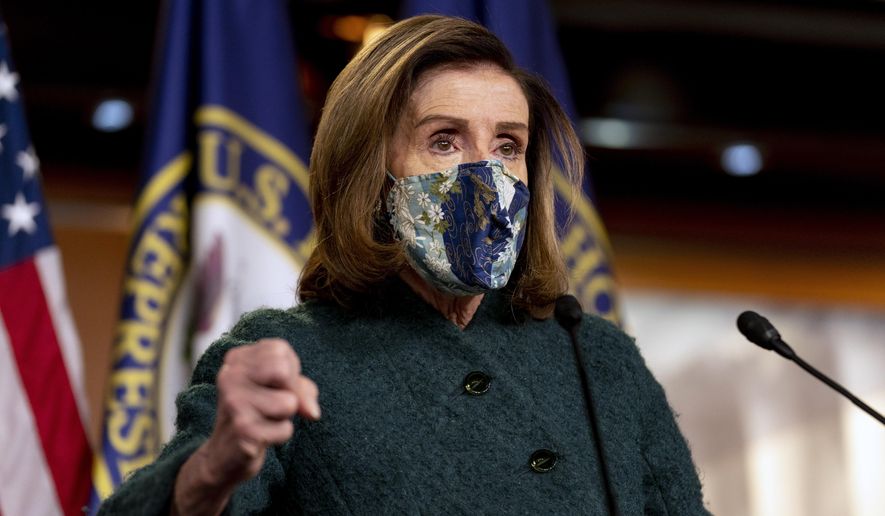A watchdog group has called out House Speaker Nancy Pelosi for a very profitable Tesla stock deal shortly before the Biden administration released plans to make the federal automobile fleet electric.
Last month, Paul Pelosi, a wealthy venture capitalist and husband of the California Democrat, bought up to $1 million worth of Tesla stock when the price was roughly $640.34 a share. The price had shot up to $838 a share by Thursday on the Nasdaq exchange.
Tesla stock has been a darling of Wall Street for years, and the company stands to reap huge profits if the federal government moves to an all-electric fleet.
The federal government has more than 645,000 cars in its fleet.
“It’s corrupt and unacceptable for members of Congress, particularly the speaker, to trade stocks in companies affected by their votes in Congress,” said John Pudner, executive director of TakeBack.org, a conservative political reform organization focused on pay-to-play corruption.
“Elected leaders from all political parties should live up to a standard of ethics that ordinary Americans see as vital to the country,” Mr. Pudner said Thursday.
A recent financial disclosure report by Mrs. Pelosi showed the couple had made 25 stock market maneuvers, known as call options, which will allow Mrs. Pelosi to buy Tesla at $500-a-share up to March 2022. The amount of the investment was as much as $1 million.
The timing of the moves proved fortuitous.
A Pelosi spokesman said her husband, not the speaker, made the Tesla bets and the speaker’s political relationships were irrelevant.
Grumbling about politicians profiting on insider information has dogged figures in both parties over the years.
In 2020, several Republican and Democratic senators were accused of reaping stock market gains after early briefings for Congress on the upcoming shock COVID-19 would deliver to the nation’s economy.
While the Senate Select Committee on Ethics cleared its members of wrongdoing, the allegations haunted former Sens. David Perdue and Kelly Loeffler, Georgia Republicans who both lost runoff elections last month, tipping the balance of power in the Senate to Democrats.
The Justice Department ultimately closed the investigation against all the senators without charges.
Some political observers say the perception of elected officials enriching themselves on information they obtain that is not available to average investors is enough to warrant barring them from playing the stock market.
“We know that mere disclosure of securities trades is not enough. The need for a stricter rule is abundantly clear,” Donna M. Nagy, a law professor at Indiana University law professor, wrote in a recent op-ed for Bloomberg Law.
In 2012, Congress passed the Stop Trading on Congressional Knowledge (STOCK) Act, but some critics feel that measure is insufficient.
A complete ban would be better, if only to save Congress members embarrassment, said James Trusty, a former federal prosecutor who currently works inside trading cases at Ifrah Law.
“Even if the actual charges are not provable beyond a reasonable doubt or trigger SEC action, the timing of trades with potential insider information always looks bad,” Mr. Trusty said. “The best route for eliminating the problem would be to have true blind trusts imposed while people serve in Congress. Not ‘peek-a-boo’ stories or anything murky, just a blanket rule while you’re in office so there’s not even a temptation to cash in on access to information.”
Last month, Sen. Elizabeth Warren, Massachusetts Democrat, reintroduced anti-corruption legislation that would ban stock trading by Congress members.
“After nearly four years of the most corrupt president in American history and with U.S. senators brazenly trading stocks to profit from a raging pandemic, the Anti-Corruption and Public Integrity Act is more urgent than ever,” read a statement from Ms. Warren and a co-sponsor in the House.
Ms. Warren’s office did not respond Thursday to questions about whether she believed the Tesla trades reported by the Pelosis were further evidence such legislation is needed.
Mrs. Pelosi’s spokesman rebuffed questions about the speaker’s stand on Ms. Warren’s bill and the move to an all-electric fleet, saying it was “not relevant.”
• James Varney can be reached at jvarney@washingtontimes.com.




Please read our comment policy before commenting.